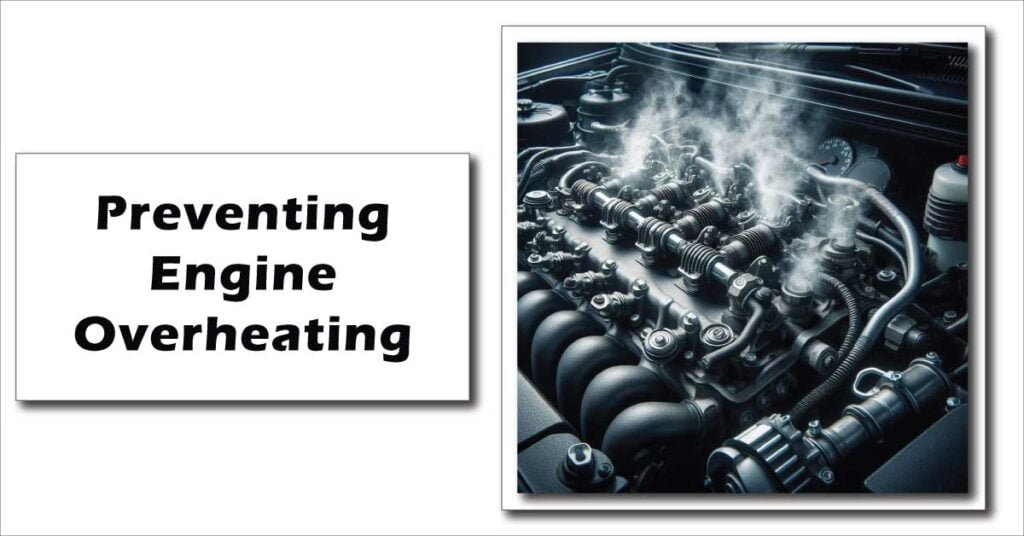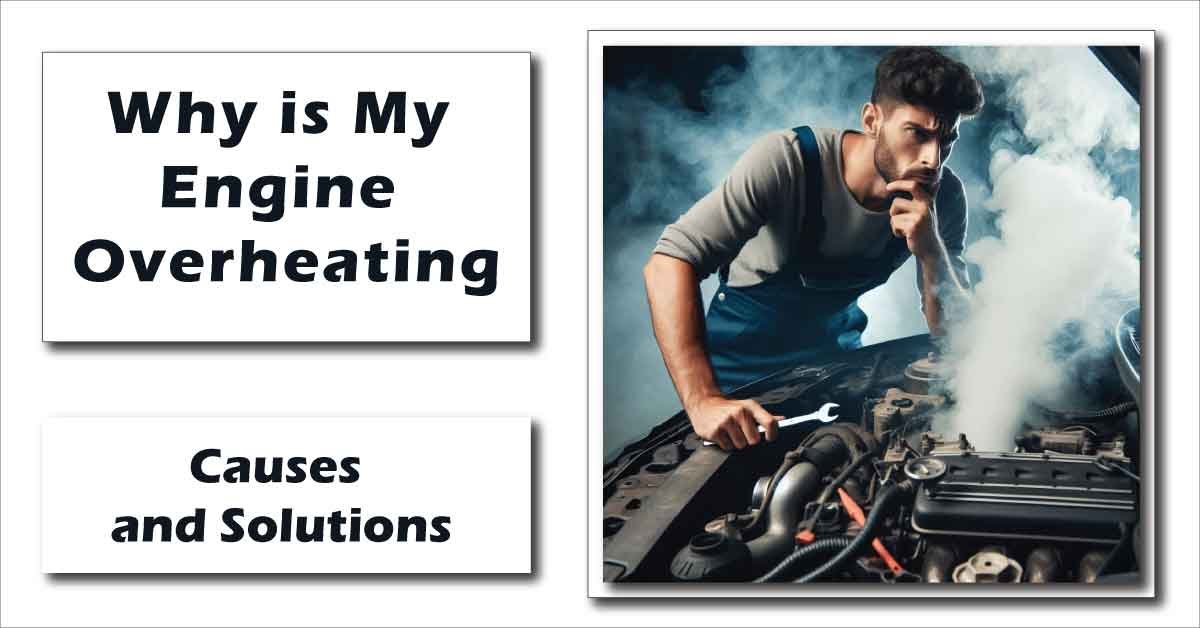Pondering over the question ‘Why is my engine overheating?’ – This comes as a big question mark for most drivers as this is one condition that cannot be easily explained. The problem has to be solved as soon as possible since it may lead to major losses for the vehicles. The goal of this article is to discuss as to why engines overheat and what the signs are that will indicate that your engine is about to overheat and some measures you can take to avoid future incidences of overheating.
What Causes Engine Overheating?
Whenever there is a problem in your engine which makes it overheat then it implies that there is a problem with the engine cooling system. The cooling system of a vehicle’s engine is supposed to control the amount of heat produced and; therefore, any fault in the cooling system can contribute to the problem of overheating of the engine. Here are some of the most common causes of engine overheating:Here are some of the most common causes of engine overheating:
1- Coolant System Failure
One of the primary reasons for an overheating car engine is a coolant system failure. The coolant system, which includes the radiator, water pump, thermostat, and coolant fluid, plays a vital role in maintaining the engine’s temperature. If any component of this system fails, it can lead to engine overheating problems.
Low coolant levels: If your engine’s coolant level is too low, it won’t be able to absorb and dissipate heat effectively, causing the engine to overheat. Regularly checking and refilling the coolant is essential for preventing overheating.
Coolant leaks: Leaks in the coolant system can also result in engine overheating. These leaks may occur in the radiator, hoses, or the water pump, leading to insufficient coolant levels and overheating.
2- Radiator Problems Causing Overheating
The radiator is a critical component of the cooling system, responsible for dissipating the heat absorbed by the coolant. Radiator problems are another common cause of engine overheating.
Clogged radiator: Over time, debris and sediment can accumulate in the radiator, restricting the flow of coolant and reducing its ability to cool the engine. This can lead to overheating, especially during high-demand conditions like driving in hot weather or towing.
Radiator fan issues: The radiator fan helps cool the coolant by blowing air across the radiator fins. If the fan fails to operate correctly, the radiator may not be able to dissipate enough heat, resulting in an overheated engine.
3- Thermostat Malfunction
It controls the circulation of matters such as coolant between the engine and the radiator. In particular, the thermostat can be locked in the closed position which will hamper proper circulation of the coolant through the radiator and thus cause the engine to burn up.
Signs of a faulty thermostat: Symptoms of a malfunctioning thermostat include erratic temperature gauge readings, fluctuating engine temperatures, and, ultimately, an overheated engine.
4- Water Pump Failure
The water pump is responsible for circulating coolant throughout the engine and radiator. A failing water pump can disrupt the flow of coolant, causing the engine to overheat.
Symptoms of a failing water pump: Common signs of water pump failure include coolant leaks, whining noises from the front of the engine, and an overheating engine.
5- Blocked or Damaged Hoses
This fluid, mainly used in transporting coolant within the engine, radiator, and all the related apparatus may be restricted or even get spoilt at times. These blockages or leaks may cause restriction in the circulation of the coolant which may result to engine over heating complications.
Inspect hoses regularly: Regular inspections of the cooling system hoses can help identify any potential issues before they lead to overheating.
Recognizing Car Overheating Symptoms
Therefore, there is need to familiarize with the signals of an over-heated engine with a view of addressing the issue before reaching an unmanageable level. Here are some common car overheating symptoms to watch for:Here are some common car overheating symptoms to watch for:
Rising temperature gauge: One of the first indicators of an overheating engine is a rising temperature gauge on your dashboard. If the needle moves into the red zone, it’s a clear sign that your engine is overheating.
Steam or smoke from the engine: If you see steam or smoke coming from under the hood, it’s a strong indication that your engine is overheating. This usually happens when the coolant is boiling and escaping as steam.
Strange smells: A sweet, syrupy smell could indicate a coolant leak, while a burning smell might suggest that engine oil or other components are overheating.
Engine misfiring or loss of power: Overheating can cause the engine to misfire or lose power, as the excessive heat affects the combustion process.
Warning lights: Some vehicles have a specific warning light for engine temperature. If this light comes on, it means your engine is overheating and needs immediate attention.
Overheated Engine Troubleshooting
If you find yourself dealing with an overheating engine, it’s essential to act quickly to prevent further damage. Here’s a step-by-step guide to overheated engine troubleshooting:
1 -Pull Over Safely
As soon as you notice your engine is overheating, find a safe place to pull over and turn off the engine. Continuing to drive with an overheating engine can cause severe damage, such as a blown head gasket or warped engine components.
2- Let the Engine Cool Down
Do not attempt to open the hood or the radiator cap shortly after a car has been stopped because the liquid in the radiator can scald you. The best practice is to wait for half an hour so that engine cools down before starting the next step.
3- Check the Coolant Level
Once the engine has cooled, check the coolant level in the radiator and the overflow reservoir. If the coolant level is low, add coolant or water to the reservoir (if you don’t have coolant on hand) to help cool the engine.
4- Inspect for Leaks
Look for any visible coolant leaks under the vehicle or around the radiator, hoses, and water pump. Leaks are a common cause of engine overheating problems and should be addressed as soon as possible.
5- Check the Radiator Fan
Finally check that the automotive radiator fan is in proper working condition before taking it for a drive. Such a situation may be due to a problem with the motor or the relay, but if the fan is not running when the engine is hot, then the problem must be fixed.
6- Restart the Engine and Monitor
After addressing any immediate issues, restart the engine and monitor the temperature gauge. If the engine continues to overheat, it’s best to have your vehicle towed to a mechanic for a thorough inspection.

Preventing Engine Overheating
A major area of focus when it comes to preventing leakage is a car’s cooling system and trying to sort out any problems that may be present before the situation gets out of hand. Here are some tips for preventing engine overheating:Here are some tips for preventing engine overheating:
1- Regular Cooling System Maintenance
Routine maintenance of the cooling system is crucial for preventing overheating. This includes regular checks of the coolant level, inspecting hoses and belts for wear, and flushing the radiator to remove any buildup of sediment.
2- Replace the Thermostat and Water Pump
The water pump and thermostat require replacement periodically due to wear and tear, and if they wear out, it causes overheating. Prescribing the replacement in accordance with the manufacturer’s guidelines is advisable.
3- Use the Right Coolant
Always use the coolant recommended by your vehicle’s manufacturer. Mixing different types of coolant or using water instead of coolant can reduce the effectiveness of the cooling system and lead to overheating.
4- Check the Radiator and Fan
Ensure that the radiator and radiator fan are in good working condition. Regularly inspect the radiator for any blockages or damage, and check that the fan operates when needed.
5- Address Warning Signs Promptly
However, if you experience or see any sign or symptom that indicates car overheating, do the needful as a matter of urgency. If ignored, these signs may signify worse issues or necessitate more expensive repairs.
What to Do If Engine Overheats
If your engine does overheat despite your best efforts, knowing what to do if the engine overheats can save you from further damage:
Don’t Panic: Stay calm and follow the steps outlined in the troubleshooting section. Panicking can lead to hasty decisions that may cause more harm than good.
Avoid Opening the Radiator Cap: As mentioned earlier, the coolant is extremely hot and can cause severe burns. Wait until the engine cools down before checking the coolant level.
Call for Help if Necessary: If you’re unable to resolve the issue on your own, it’s best to call for roadside assistance or have your vehicle towed to a professional mechanic.
Conclusion About Why is My Engine Overheating
This shows that engine overheating is a very critical problem that needs to be addressed. If you know the most frequent causes, know the signs when something is wrong, and follow the correct procedure in correcting a problem, you can greatly reduce the amount of critical harm to a vehicle. Keeping the engine cooling system in proper working order through checking the coolant level, pressure, and leaks, and to ensure that the radiator and fan are in good working condition can help avoid cases of overheating of the engine. It is always important to be ahead of any signs to ensure that your vehicle’s cooling system does not give you a bad time on the road.
Struggling with how to fix an overheating engine or how to prevent engine overheating? Our latest post provides clear, actionable steps to address these common issues. Discover practical solutions to cool down your engine and effective tips to avoid future overheating problems. Read the full article for detailed guidance and ensure your engine runs smoothly.

